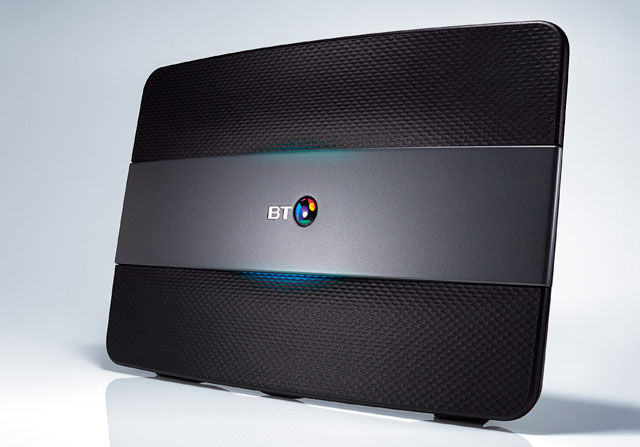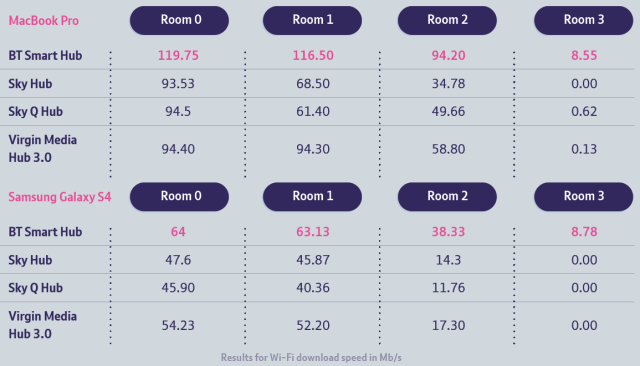
When the new BT Smart Hub (aka Home Hub 6) was unveiled, BT it boldly claimed that the router had the UK's most powerful Wi-Fi signals, and thus the implicit assertion that BT broadband is the best choice for fast, reliable downloads throughout the house.
The new BT Smart Hub is also capable of creating a Wi-Fi connection with a laptop 500 metres away through a single wall, or a tablet at 350m, says BT.
But how legitimate are those claims? We've spent the last 24 hours trying to squeeze some more information about of BT, with some success. We haven't yet obtained the company's methodology for the long-range testing—500m with a home router is quite something—but we have received BT's internal test results that are likely used as the basis for its "most powerful Wi-Fi signal" claim.
BT Smart Hub vs. Virgin, TalkTalk, and Sky
First, take a look at BT's figures:

Hardware-wise, the BT Smart Hub has seven antennas—good for 3x3 MIMO at 2.4GHz (max throughput ~200Mbps) and 4x4 MIMO at 5GHz (max throughput ~1700Mbps). There are four gigabit Ethernet ports and a single USB 2.0 port (USB 3.0 was passed over due to "higher levels of interference," BT told Ars).
BT says that Room 0 is the same room as the hub; Room 1 is one brick wall away; Room 2 is through two brick walls; and Room 3 is three brick walls. Room 0 is fairly indicative of what you might get in the living room, assuming that's where you have the hub; Room 3 is what it might be like at the back of a large house, or in an internal bathroom upstairs.
The most notable figures are for Room 1 and Room 2, which show the Smart Hub attaining very decent speeds even through a couple of brick walls. If you live in a flat or smaller house, you probably won't be more than two brick walls away from the hub. If you currently struggle to surf Ars Technica while sitting on the toilet, the Room 3 figures are very encouraging.
BT is waiting for the full roll-out of the Smart Hub before it gives away too much info, but it did confirm with Ars that each hub was tested fairly. There are lots of variables that we don't know, though, such as the amount of interference from other nearby Wi-Fi networks, or what was actually being downloaded and from where. For example, I've personally hit download speeds of 400Mbps+ with my late-2013 Retina MacBook Pro on a first-gen 802.11ac network back in early 2014; so what is BT doing to "only" hit 120Mbps in 2016 on newer hardware?
Presumably the test involved downloading a file from the Internet—but then that implies BT is connecting to the Internet with something other than FTTC/VDSL (which is limited to ~76Mbps).
Contemporaneous victory!
The brief conclusion: Yes, it really looks like the BT Smart Hub will allow for faster and more reliable connections than the routers currently provided by Virgin, Sky, and TalkTalk.
The longer, more convoluted conclusion: The BT Smart Hub is simply the newest device out of the current crop of ISP-provided routers. The Sky Hub is now over two years old, and isn't even capable of 802.11ac; the Virgin Media Hub 3.0 is a year old, and thus only has an early-gen 3x3 802.11ac SoC; and likewise, the TalkTalk Super Router is about two years old, and thus missed out on some newer tech.
Yes, the BT Smart Hub has more antennas than the competition, and support for 4x4 802.11ac, and some useful features such as "smart scan" that help find Wi-Fi channels with less interference—but these are mostly just the result of BT using a newer Wi-Fi SoC. It is possible that some of the gains come from clever design and engineering, but we're probably talking about a few percent either way. When Sky, TalkTalk, and Virgin Media get around to updating their routers with newer Wi-Fi guts, they will probably offer very similar performance to BT's Smart Hub.
The new Smart Hub (or Home Hub 6 depending on your point of view) has started rolling out to BT broadband customers, with broader distribution on its way over the next few weeks. If you haven't received your new hub yet, go ahead and register your interest.
reader comments
16